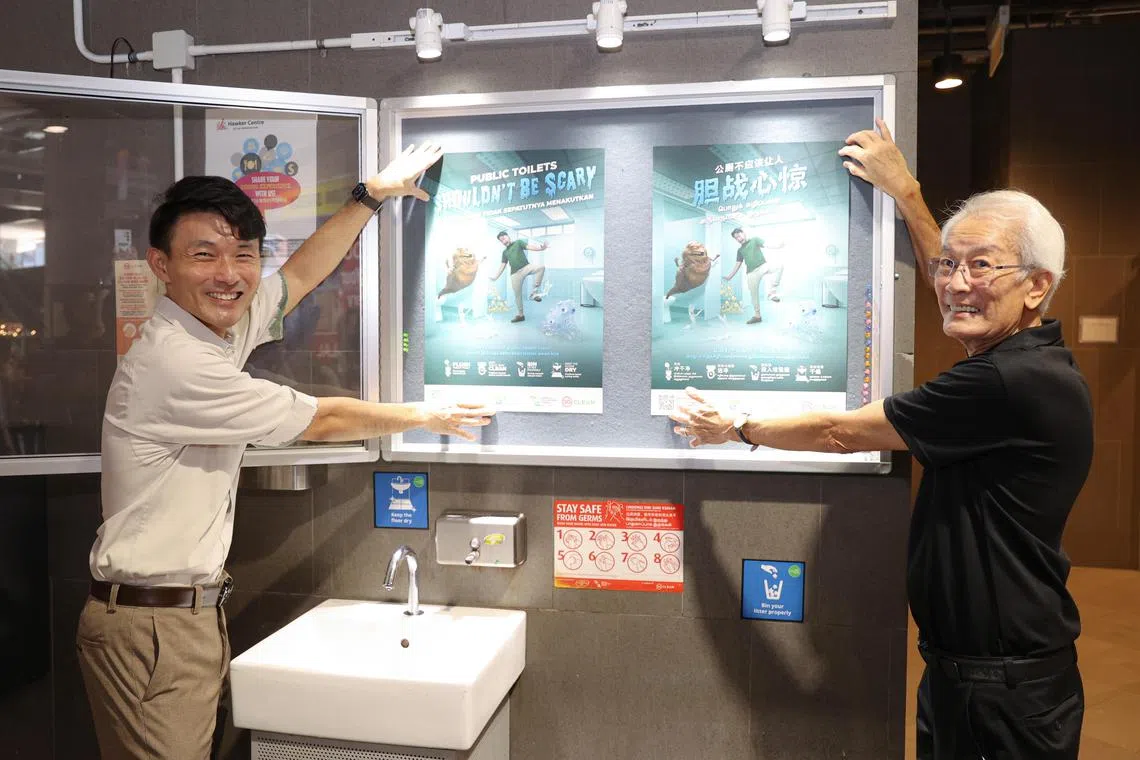Hawker centre and coffee shop toilets cleaner than in 2020: NEA survey
Sign up now: Get ST's newsletters delivered to your inbox

Senior Parliamentary Secretary for Sustainability and the Environment Baey Yam Keng (left) and Chairman of the Public Hygiene Council Edward D’Silva putting up posters for this year’s clean public toilets campaign.
PHOTO: LIANHE ZAOBAO
Follow topic:
SINGAPORE - Toilets located in public places were found to be cleaner in a recent survey, despite the lifting of Covid-19 restrictions which saw more people out and about.
The National Environment Agency (NEA) said its survey showed that hawker centres, coffee shops and bus interchanges saw improvements in overall toilet cleanliness levels compared with a similar survey in 2020.
Lavatories in nine types of premises accessible by the public were checked this time, compared with checks at only toilets in MRT stations, bus interchanges, hawker centres and coffee shops in 2020.
The findings were released on Wednesday at the launch of this year’s clean public toilets campaign by NEA and the Public Hygiene Council.
Speaking at the event at Our Tampines Hub, Senior Parliamentary Secretary for Sustainability and the Environment Baey Yam Keng noted that public toilets were cleaner despite the increase in use with the relaxation of Covid-19 measures.
“This is quite significant because today, versus two years ago, there are a lot more users with relaxation of the pandemic measures.
“So it means that even though there are more people using our public facilities, the level of cleanliness has increased.”
But he added that even as more facilities and businesses open up, hiring more cleaners would be challenging.
“Workforce numbers is one thing, but there is also the quality and training that they go through so that they are able to do the job well.
“So we must also rely on technology, whether it’s cleaning equipment, detergents or the design of toilets. Sometimes the design of toilets can be conducive for people to keep the place clean.”
Madam Kam Feng Lian, 65, who has worked as a cleaner at Our Tampines Hub hawker centre for four years, offered a clue as to why toilets were cleaner.
“People have become more conscious of personal hygiene during the pandemic, because they are scared of the virus and the spread of disease,” she said in Mandarin.
The Clean Public Toilets Campaign in 2022 aims to continue urging users to adopt the behaviours of “Flush, Clean, Bin, Dry”.
Oil company Esso Singapore and e-commerce firm Lazada are joining in the efforts for the first time.
Esso will put up posters in gas station toilets to remind people to keep them clean, while Lazada will reward app users, who access campaign messages, with coins which can be used to offset their next purchase or redeem discount vouchers.
This is in addition to organisers running the campaign on free-to-air television, and out-of-home, digital and social media platforms.
Posters and wall stickers will also be installed in public toilets at hawker centres, selected coffee shops, parks, beaches and community clubs.
The Public Hygiene Council is also working with over 100 coffee shop operators to nudge cleaners and users to keep toilets clean.
Mr Edward D’Silva, who chairs the Public Hygiene Council, said they initially had difficulty convincing coffee shops to participate, as operators said they had no manpower and could not control the behaviour of toilet users. But the council managed to convince three operators after telling them about the benefits of clean public toilets.
“If you keep the toilet nice and presentable, your users will feel more comfortable. And then by peer pressure, everybody that comes after that will keep the toilet clean. It’s like the airport toilets – if it’s clean, everybody will keep it clean,” he said.
NEA’s survey used an index to measure the cleanliness level in different parts of a toilet, such as whether toilet bowls were flushed and whether the floor was dry. The highest score was five points.
Coffee shop toilets saw the biggest improvement, jumping from 2.77 points in 2020 to 3.6 in 2022. The score for hawker centre toilets improved from 3.02 to 3.65, while that for bus interchange toilets was up from 3.52 to 3.88.
Operators can face penalties if toilets are not clean.
Those who fail to provide basic amenities such as soap or toilet paper, or to keep toilets clean, can be fined up to $400.
Lapses such as insufficient basic amenities and unclean toilets in food and non-food establishments can incur a fine of between $2,000 and $5,000.


